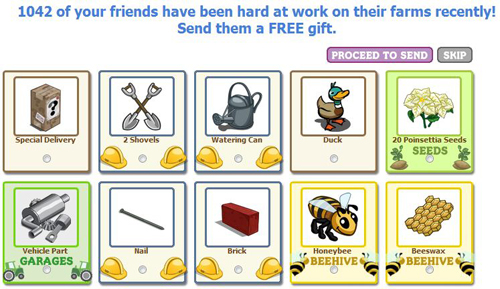Facebook游戏病毒式传播需知的四个要点
游戏邦注:本文原作者是布伦达·布瑞斯伟特(Brenda Brathwaite),拥有20多年游戏设计经验,代表作品包括《Jagged Alliance》和《Wizardry》系列,目前是社交游戏开发商LOLapps公司的创意总监。
开发商在创建Facebook游戏时都要面临的一个问题就是,如何让玩家自觉通过病毒式传播渠道推广游戏。一般来说,用户刚开始玩游戏的时候,都会很愿意发布消息,但如果要吸引回头客用什么方法最有效?
以下是游戏邦通过作者原文总结出的4个要点:
* 能够帮助玩家。有某一款道具或目标对于游戏进展下去至关重要,但我需要朋友的帮助才能实现。一般的游戏都有设置“请好友救助”功能选项,所以如果我不想花钱买通这一关,但又想加速游戏进程,那就只有向朋友发布救助信息这条路可选了。
* 能够帮助朋友。这项功能也能帮助朋友,有些玩家会很乐意把自己遇到的问题,自己认为好友可能也会需要的信息发布上去。我知道有些道具很有价值,也很稀罕,但随着游戏进程的发展,这些东西的价值可能就会降低,不再那么稀奇了。玩家刚开始玩游戏时感兴趣的东西,可能最后对自己就没多大作用了。但这是不是说病毒式传播信息就应该改变?不一定,迎合玩家的需求和其认知的价值观,是很重要的。我曾看到系统提供的信息充满许多我不感兴趣的东西,没有让我点击的欲望。有些时候,系统会提醒我发布一些对我已经没什么价值的东西给好友。这个时候,我也同样不会发布信息。
* 对双方都有好处。《Cow Clicker》这款恶搞版的游戏,建议玩家在系统中发布病毒式传播消息,其他人只要一点击这个消息,就可以获得可换取更多点击率的“mooney”,而最初发布消息的玩家自己也可以从中获益,赢取“mooney”。这是一种互惠的传播方式,游戏中唯一交易的东西就是“点击率” 。
* 让玩家有自豪感。 如果我完成了一项很自豪的游戏成就,或者赢得了某个稀有的道具,那我肯定愿意发消息,让大家都来分享这个好消息。最近,我发布了一个消息告诉好友,我终于闯到第17关了,这可费了好一番功夫呢。我保证如果我建造完成了另一款游戏里的小教堂,我也会发布消息的。
那是不是说只有符合以上四点我们才发布信息呢?并非如此。某个让玩家感到自豪的东西,可能会令另一个玩家感到沮丧。例如,完成了一项需要搜集许多东西的任务,可能让一个玩家觉得很刺激很有挑战性,但也可能会让其他玩家感到不快。同样地,有一些玩家非常痛恨这些提示信息,而有些人却很喜欢点击它们。
事实上,有许多玩家觉得这种“信息发布”已成为游戏本身之外的一种乐趣。当然我们不希望限制玩家发布病毒式消息的权利,尤其是当我们的游戏有赖于这种功能的时候,但我们也不希望过度地使用这种功能。
根本来说,抵制次级病毒式传播消息的方法就是只玩自己的游戏就好。你有点击不请自来的信息的冲动吗?如果没有,别人又何尝不是呢?你是有意识地点击吗?你有没有比较一下有用的信息和垃圾信息,看看它们的差别在哪呢?你有把竞争者视为掠夺者吗?请记住,即使游戏中只有你自己一个人,也看看别人是怎么玩的,特别是当别人的玩法和你完全不同时。
分析下自己的玩法,看看游戏有什么吸引力,找到创造最有吸引力的病毒式传播机制,好让别的玩家有点击信息的冲动。(本文为游戏邦编译/gamerboom.com编译,转载请注明来源:游戏邦)
Motivating Virality in Facebook Games
[Editor's note: Brenda Brathwaite is a game designer with over 20 years of experience and credits on classic titles like Jagged Alliance and the Wizardry series. She is currently creative director at social game developer LOLapps, and a regular Inside Social Games contributor.]
Getting players to post to the viral channel is a challenge every game designer faces when he or she is making Facebook games. It’s known that players are most likely to post when they’ve just started a game, but what motivates returning players?
Four things:
It helps me. There is a particular item or objective that is core to the progression of my game with which I need your help. Typically, the game allows you to buy your way out of the “Ask Friends For Help” option. But if I need your help to progress, rather than paying cash, I’ll probably post it.
I know it helps you. It’s key here that it actually does help other players. I am likely to post something to my feed if it gives you something I would want for myself. I understand the item’s value and scarcity. It’s also important to consider that over the lifetime of a game as well as the curve of player progression, the value and scarcity of an object may change. What I care about in an early game may not mean anything to me later on. Does that mean the viral messages should change? Not always, but catering to player’s needs and a player’s perceived value is critical. I have seen messages in feeds which offer stuff I have absolutely no desire for. There is just no reason I would click. Other times, I am prompted to post a feed which will give my friends something that I know has no value. Likewise, I am not likely to post through.
It helps us both. Parody though it may be, Cow Clicker suggests players post a message to their feed. Anyone who clicks on the viral message not only gets “mooney” with which they can buy “clicks” to add to their “click” total, but also gives the original poster “mooney” as well. It is an example of a mutually beneficial viral which trades in the only thing that matters in the game — “clicks”.
Pride. I will post if I am actually proud of what I have achieved, be it a quest, an item or something else. Generally, I am proud of this because I want to show off the great thing that I have done. Recently, I posted that I’d leveled to 17 in a game, because it took me quite a while. When I finish building the epic chapel I am working on in another game, I can assure you I’ll post about that, too.
Does this mean we should only include virals which fit the above themes? No. What makes one player proud could make another feel frustrated at the conclusion. For instance, an epic quest to gather a lot of materials could challenge and excite one player but irritate another. Likewise, some players abhor all forms of feed messages, while others are happy to click through a wide variety of virals.
In fact, there is a whole class of player for whom “playing the feeds” has become a pleasant meta-game to the game it supports. Of course, we also don’t want to limit a player’s viral opportunities, particularly when our games depend on it, nor do we want to overdo it.
Ultimately, your only defense against subpar virals is playing your own game. Do you actually feel motivated to click your own viral message? If not, why do you think others will? Are you aware of the click through? Have you investigated the good ones vs. the lame ducks to understand what hooks they’re using? Are you watching your competitors like a hawk? Remember, though, that you are only one player in your game. Watch how others play, too, particularly if their play style is different than yours.
Analyzing your own play, feeling the hooks in the game and watching the results via metrics offers the best chance of creating compelling virals that players feel motivated to click through.(Source:Inside Social Games)








































 闽公网安备35020302001549号
闽公网安备35020302001549号